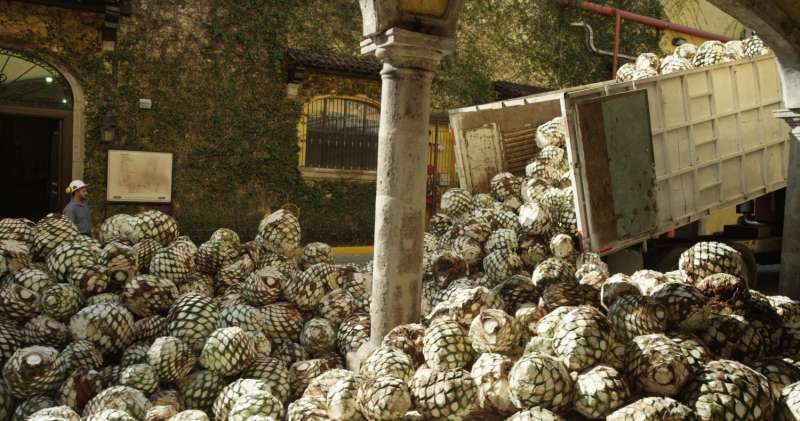Ford Motor Company is teaming up with Jose Cuervo to explore the use of the tequila producer’s agave plant byproduct to develop more sustainable bioplastics to employ in Ford vehicles. Credit: Ford Motor Company
(Tech Xplore)—Car parts made from agave? A join-up between Ford Motor Company and Jose Cuervo is showing what can be done.
Ford Motor Company is teaming up with Jose Cuervo to explore the use of the tequila producer's agave plant byproduct. The effort reflects Ford's interest in developing sustainable bioplastics for Ford vehicles.
As Consumerist pointed out, the agave fibers are what remain after Cuervo has made tequila from the plant's juice.
How would the material be used? Potentially in components such as HVAC units, wiring harnesses and storage bins. This bioplastic material is being tested for durability and heat resistance.
"There are about 400 pounds of plastic on a typical car," said Debbie Mielewski, Ford senior technical leader, sustainability research department, in a statement announcing the partnership. "Our job is to find the right place for a green composite like this to help our impact on the planet."
What benefits could success in this exploration carry? (1) Success in developing the sustainable composite could reduce the weight of car parts, and this could support fuel economy; (2) the material could alleviate the use of petrochemicals.
Jose Cuervo grows the plant and ferments it. Founded in 1795, it has been making tequila for more than 220 years. There would be another life for these plants.
The news release explained that "Jose Cuervo uses a portion of the remaining agave fibers as compost for its farms, and local artisans make crafts and agave paper from the remnants. Now, as part of Jose Cuervo's broader sustainability plan, the tequila maker is joining forces with the automaker to develop a new way to use its remnant fibers."
Consumerist reported that "Cuervo harvests upwards of 300 tons of agave each day, and most of the leftover fibers have historically been discarded or incinerated."
The Detroit News said Jose Cuervo earlier this year had shipped boxes of previously discarded fibers to Dearborn for testing. "A Ford team is working to understand all the benefits and uses for the agave material."
What's next? Environmental Leader reported that the companies say initial assessments look good—good in the sense that the durability and aesthetic qualities show promise.
The very attempt to give the plants a new life in the auto industry is seen as a step in the right direction. According to the United Nations Environment Programme, 5 billion metric tons of agricultural biomass waste is produced annually. The materials can be relatively low cost, and can help manufacturers to offset the use of glass fibers and talc, for more sustainable, lightweight products.
© 2016 Tech Xplore






















